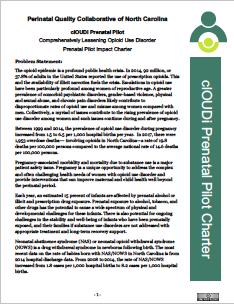The opioid epidemic is a profound public health crisis. In 2014, 92 million, or 37.8% of adults in the United States reported the use of prescription opioids. This and the availability of illicit narcotics fuels the crisis. Escalations in opioid use have been particularly profound among women of reproductive age. A greater prevalence of comorbid psychiatric disorders, gender-based violence, physical and sexual abuse, and chronic pain disorders likely contribute to disproportionate rates of opioid use and misuse among women compared with men. These demographic shifts have contributed to the rising prevalence of opioid use disorder during pregnancy.
Between 1999 and 2014, the prevalence of opioid use disorder during pregnancy increased from 1.5 to 6.5 per 1,000 hospital births per year. In 2017, there were 1,953 overdose deaths involving opioids in North Carolina—a rate of 19.8 deaths per 100,000 persons compared to the average national rate of 14.6 deaths per 100,000 persons.
Pregnancy-associated morbidity and mortality due to substance use is a major patient safety issue. Pregnancy is a unique opportunity to address the complex and often challenging health needs of women with opioid use disorder and provide interventions that can improve maternal and child health well beyond the perinatal period.

